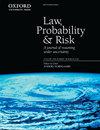权利与仪式之间:危机与契约的反讽
IF 2.7
4区 社会学
Q1 LAW
引用次数: 0
摘要
合同法制度是否处于危机之中?契约和其他权利是社会主义的一种制度,社会学家费迪南德Tönnies对现代社会的比喻。无论国家是否执行,这些权利都以抽象的原则和规则具体化。道德和社会规范、习俗和礼仪更能让人联想到Gemeinschaft,这是对宗教、家庭、部落或社区传统的相应隐喻。具有讽刺意味的是,对权威来源的呼吁,无论是法律上的还是神圣的,都是相似的。历史的弧线只是隐喻地从“共同体”到“共同体”。我们仍然可以通过行使权利或给予礼遇来应对危机,比如金融危机或全球流行病。本文探讨了法律权利(包括合同)中权利的具体化是否有助于或损害我们以合理和人道的方式相处的能力。这场“危机”与其说是教义方面的问题,不如说是道德方面的问题;与其说是权利的执行,不如说是权利持有人是否愿意把权利放在一边。在危机期间,狭隘的眼光和对抽象合同权利的盲目忠诚很可能是罪魁祸首,而不是英雄。本文章由计算机程序翻译,如有差异,请以英文原文为准。
Between Rights and Rites: The Ironies of Crisis and Contract
Is the institution of contract law in crisis? Contract and other rights are an institution of the Gesellschaft, the sociologist Ferdinand Tönnies’s metaphor for modern society. There entitlements reify in abstract principles and rules, whether or not the state enforces them. Moral and social norms, customs, and courtesies are more evocative of the Gemeinschaft, the corresponding metaphor for the traditions of religion, family, tribe, or community. The irony is the similarity between appeals to authoritative sources, whether legal or divine. The arc of history is only metaphorically from Gemeinschaft to Gesellschaft. We can still react to crises, like financial meltdowns or global pandemics, by the invocation of rights or the granting of courtesies. This essay considers whether the reification of entitlements in legal rights (including contract) contributes or detracts from our ability to get along in a reasonable and humane way. The “crisis” is far less about elements of doctrine than it is of morality; less about the enforcement of rights and more about the holders’ willingness to set them aside. During crisis, tunnel-visioned and slavish devotion to abstract contract rights may well be a culprit, not a hero.
求助全文
通过发布文献求助,成功后即可免费获取论文全文。
去求助
来源期刊

Law Probability & Risk
MATHEMATICSSTATISTICS & PROBABILITY&-STATISTICS & PROBABILITY
CiteScore
2.10
自引率
28.60%
发文量
8
期刊介绍:
Law, Probability & Risk is a fully refereed journal which publishes papers dealing with topics on the interface of law and probabilistic reasoning. These are interpreted broadly to include aspects relevant to the interpretation of scientific evidence, the assessment of uncertainty and the assessment of risk. The readership includes academic lawyers, mathematicians, statisticians and social scientists with interests in quantitative reasoning.
The primary objective of the journal is to cover issues in law, which have a scientific element, with an emphasis on statistical and probabilistic issues and the assessment of risk.
Examples of topics which may be covered include communications law, computers and the law, environmental law, law and medicine, regulatory law for science and technology, identification problems (such as DNA but including other materials), sampling issues (drugs, computer pornography, fraud), offender profiling, credit scoring, risk assessment, the role of statistics and probability in drafting legislation, the assessment of competing theories of evidence (possibly with a view to forming an optimal combination of them). In addition, a whole new area is emerging in the application of computers to medicine and other safety-critical areas. New legislation is required to define the responsibility of computer experts who develop software for tackling these safety-critical problems.
 求助内容:
求助内容: 应助结果提醒方式:
应助结果提醒方式:


